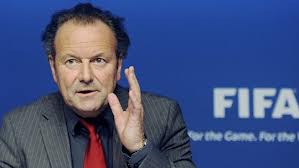By Andrew Warshaw
April 24 – Mark Pieth, the Swiss governance expert appointed by FIFA to propose recommendations for change following the worst corruption-tainted period in its history, says the organisation must allow an ongoing investigation into the 2018 and 2022 World Cup ballots to take its course if it wants to retain any sense of credibility.
Last month, this website reported that FIFA had side-stepped a potential new storm after it emerged that tentative moves were taken by senior figures to try and shut down the probe into the voting procedure led by ethics committee prosecutor Michael Garcia.
The proposed plot was revealed by reformist executive committee members who joined FIFA’s hierarchy after the controversial World Cup ballot held in December 2010, and won by Russia and Qatar respectively. Garcia is understood to have irritated some of the 13 remaining voters still in office by arriving unannounced in Zurich to quiz them.
Pieth, who terminated his association with FIFA at the end of last year and who only saw some of his recommendations implemented, gave his unequivocable support to Garcia’s probe – and urged FIFA’s senior officials to co-operate fully.
“The ethics committee should not rest until there is a conclusive answer,” Pieth wrote in his hard-hitting final report, covering 15 pages, to executive committee members.
Pieth was appointed in the autumn of 2011 to lead the Independent Governance Committee advisory group set up by FIFA president Sepp Blatter as part of his so-called road map to reform. But the Basel professor had several notable disagreements with the organisation’s top brass during an often feisty partnership.
“If FIFA is to emerge from the scandals of recent years it must now produce a convincing and transparent answer to any issues relating to hosting decisions, either to confirm that the suspicions are, sadly, well founded or to demonstrate that they are groundless,” his final report states.
“This explicitly included allegations in relation to World Cup hosting decisions and the IGC singled out this issue including the decision to award the tournament to Qatar as one that required further investigation.”
“The IGC’s view was that only appointing a competent and experienced professional outsider to this role would enable FIFA fearlessly to investigate allegations of corruption at the heart of FIFA. FIFA and all involved individuals must therefore fully and unconditionally co-operate with Mr. Garcia’s investigation.”
Garcia is expected to report by the end of this year to the ethics committee’s adjudicatory chamber led by Joachim Eckert of Germany, which will decide on any sanctions. It is believed the ethics committee does not have the power to recommend stripping either Russia or Qatar of host status, only to punish individuals.
“If allegations are confirmed, FIFA must ensure that the consequences are meaningful,” Pieth nevertheless wrote.
“This is … the opportunity for FIFA to demonstrate that it has learned the lessons of the past and is determined to see a transparent and open organisation setting an example of the highest ethical standards in the interests of the game and in the wider public interest.”
Pieth makes the point that some of the key IGC proposals remain unresolved, derailed, as he puts it, by “vested interests”. One of these concerns age and term limits while another focussed on a suggestion that salaries of FIFA’s inner circle, including that of the president, be made public “on a best practice level compared to multinational corporations.”
The issue of age and term limits is due to be addressed again at FIFA’s 2014 Congress in São Paulo ahead of the World Cup but seems unlikely to reach any conclusion.
Contact the writer of this story at moc.l1745188951labto1745188951ofdlr1745188951owedi1745188951sni@w1745188951ahsra1745188951w.wer1745188951dna1745188951

